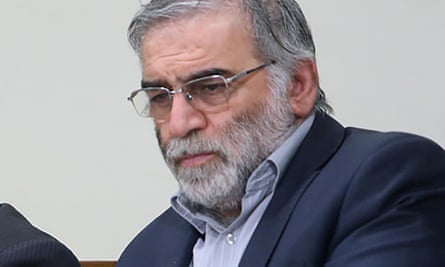Fakhrizadeh is considered one of the masterminds of Iran's nuclear program. In April 2018, Netanyahu mentioned Fakhrizadeh by name when he unveiled a nuclear archive he said Mossad agents had taken from Tehran. His assassination derived many fiery statements that might be translated into action, but considering the timing and Iran’s capabilities, these statements might be all that Iran could deliver.
THREATS AND CONTEXT
Iranian Foreign Minister Zarif called the death "cowardice,” and indicated an Israeli role. The head of Iran's Revolutionary Guards Corps, Hossein Salami, issued a statement calling the killing a "terrorist operation.” Ali Akbar Velayati, international affairs adviser to Iran's Supreme Leader Ayatollah Ali Khamenei, said in a statement: "The Iranian nation will avenge the blood of this great martyr from the terrorist elements and their supporters." The Chief of Staff of the Iranian Armed Forces, Major General Mohammad Bagheri, warned of "severe revenge" against "the killers" of Fakhrizadeh, state-news agency IRNA reported.
Lebanese Hezbollah also condemned the killing. Hassan Nasrallah’s Deputy, Naim Qassem, said that agents of the US and Israel were behind the assassination. "We condemn this sinful attack, and we see that the response to this crime is in the hands of those concerned in Iran. We are not shaken by assassinations," Qassem said during an interview with Hezbollah-owned al-Manar TV.

Despite all the threats and promises to avenge Fakhrizadeh, it has become clear that Iran’s regime is too infiltrated and too fragile to respond. It has yet to respond properly to Soleimani’s assassination, and the many other attacks it has suffered throughout 2020. The choices the regime has are all bitter: Respond and start a conflict that would further weaken it, and damage its stances ahead of a possible resumption of talks with the Biden administration, or not respond and suffer further humiliation and decline of its image within its support base, inside Iran and in the region.
Although there is no evidence on who was behind the attack, reports indicate that Israel is involved, mainly that Israel was behind similar assassinations of four other Iranian nuclear scientists between the years 2010 and 2012. But if Iran decided to respond, this could lead to a regional war that would engulf Iran, Iraq, Syria and Lebanon, as Iran’s role in these countries has evolved and increased, as well as Israel’s attacks against Iranian facilities and personnel. In such as war, Iran risks losing a lot more than it has already lost, and the pragmatic thinking of the Iranian regime understands these risks, especially in the context of the financial crisis and the hard-hitting impact of COVID-19 on Iran’s health and economic sectors.
But what worries the Iranian regime most is the possibility of increased attacks against its facilities and assets during the transition period; that is, before the inauguration of Joe Biden as the US President.
INTERNAL DIVISIONS AND SCENARIOS
All that being said, the Iranian regime does not have a coherent or unified stance to its response options, and its leadership is also divided over the approach the regime needs to adopt regarding the possible future talks with the new US administration. One of the main factors is Biden’s close ties to Israel and the probability of considering Iran’s regional terrorist activities in the region – from the militias to regional hegemony – during the negotiations. Also, Biden’s foreign policy team seems to be more aware of Iran’s regional ambitions than Obama’s foreign policy team, and more adamant on containing it.
Considering all that, the most likely scenario for Iran right now is to do nothing, and hope they can get the Biden administration to start negotiations without delay, and with no additional conditions. But this scenario is a bitter one as well. Doing nothing – mainly during the crises – could backfire and strip Iran of much-needed bargaining chips. This could lead to further fractions and divisions within the regime structure as well, with the hardliners feeling a stronger urge to retaliate while others want to give diplomacy a chance.
Looking forward, with no ability to retaliate, Iran not only loses a major bargaining chip, it also opens the possibility for more assassinations and attacks on its forces across the region. But most importantly, the main downside of this calculation during this critical time is the fact that Biden is not in a rush to jumpstart the nuclear talks. Iran’s hopes for a diplomatic solution to its financial crisis might be tested and its strategic patience could be required to stretch to its limits.
Although Biden has said many times that he will seek to reinstate some form of a nuclear deal with Iran, he has said Obama’s 2015 nuclear deal framework would be a starting point for negotiations with Iran, rather than the end goal. Biden is likely to include regional allies and other stakeholders in an Iran deal 2.0 and up the pressure on Iran.
In addition, Biden has other priorities to address first, such as the pandemic, China, and Russia, and it might take him a while to turn to Iran. And when he does, the Iranians might have to compromise and move forward, while the US does not have to. Biden is not Obama and his legacy is not the Iran Deal. Getting there might take a couple of years if not more. Meanwhile, Iran’s economy and internal divisions will most probably lead to further deterioration of the system and the weakening of the regime and its proxies.
Whatever Iran does, its options are limited, and they all look weak and ineffective. No matter how you turn it, it is a lose-lose situation, and the Iranian regime is open to losing even more.









